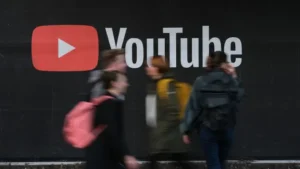
KEY POINTS
YouTube is launching a tool that will allow users to create AI-generated music using the voices of popular music artists.
Nine artists have lent their voices to the software, including John Legend, Demi Lovato, T-Pain, and Sia, among others.
The launch comes as the company navigates the changing landscape of of AI technology and music, alongside major music labels.
YouTube is launching a new tool powered by artificial intelligence that will allow users to record audio using the voices of some of today’s most famous musicians, the company announced Thursday.
The new product, called “Dream Track,” is a collaboration with nine musical artists including John Legend, Demi Lovato, T-Pain, and Sia, among others. Through text-based directions, users can auto-generate short tracks of up to 30 seconds in the voice and style of a participating artist.
As of launch, about 100 creators in the U.S. will have access to the tool. It will be limited to YouTube Shorts, the platform’s short-form video sharing feature which rivals TikTok, owned by Chinese technology giant ByteDance.
The launch comes as the video giant, owned by Alphabet
, looks to capitalize on the intersection of AI technology and music, and as it reckons with the new technology’s ethical and legal implications alongside artists and major record labels. In the past, the practice of using artists’ voices without their consent for generative AI, likened to plagiarism, has come under fire by labels and lawmakers, alike.
In a blog post Thursday, YouTube executives said, “AI has brought music to the cusp of a new creative era,” and the platform hopes its approach will be “defined by partnership and responsibility.”
“At this initial phase, the experiment is designed to help explore how the technology could be used to create deeper connections between artists and creators, and ultimately, their fans,” YouTube head of music Lyor Cohen and VP of emerging experiences and community products Toni Reid wrote in a blog post Thursday.
In the blog post, the company shared samples of what AI-generated music experiments — built in collaboration with Google DeepMind — would sound like. The company also featured statements from the artists themselves, who framed the platform as a way to have a stake in the emerging AI music space.
“As an artist, I am happy to have a seat at the table and I look forward to seeing what the creators dream up during this period,” Legend said.
Lovato added, “The development of AI technology is rapidly changing the way we navigate the landscape and I believe as artists we need to be a part of shaping what that future looks like.”
AI-generated music has sprung up across the site in recent months, racking up millions of views, without the permission of artists or record labels. One example is the viral song “Heart On My Sleeve,” which used AI-generated vocals from Drake and The Weeknd. In April, Universal Music Group petitioned YouTube and other music sharing sites to remove the song over copyright claims.
CNBC reached out to Universal Music Group for comment.
The launch of Dream Track is a part of a suite of AI-related experiments that parent company Google has rolled out in recent months as it aims to get ahead of the emergence of AI technology. Last month, the company unveiled “Dream Screen,” will allows users to add AI-generated backgrounds or short videos to their content just by writing in a prompt.
